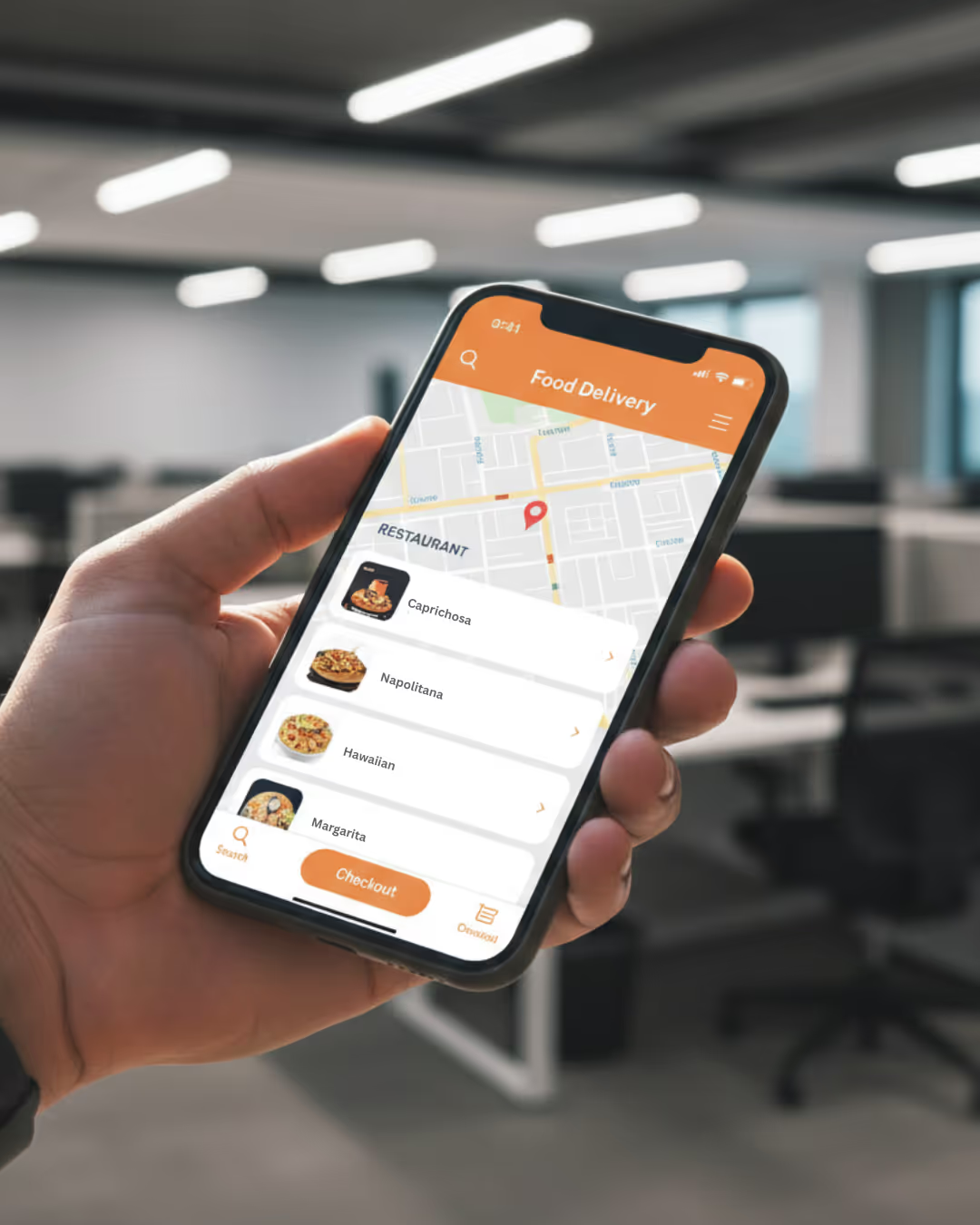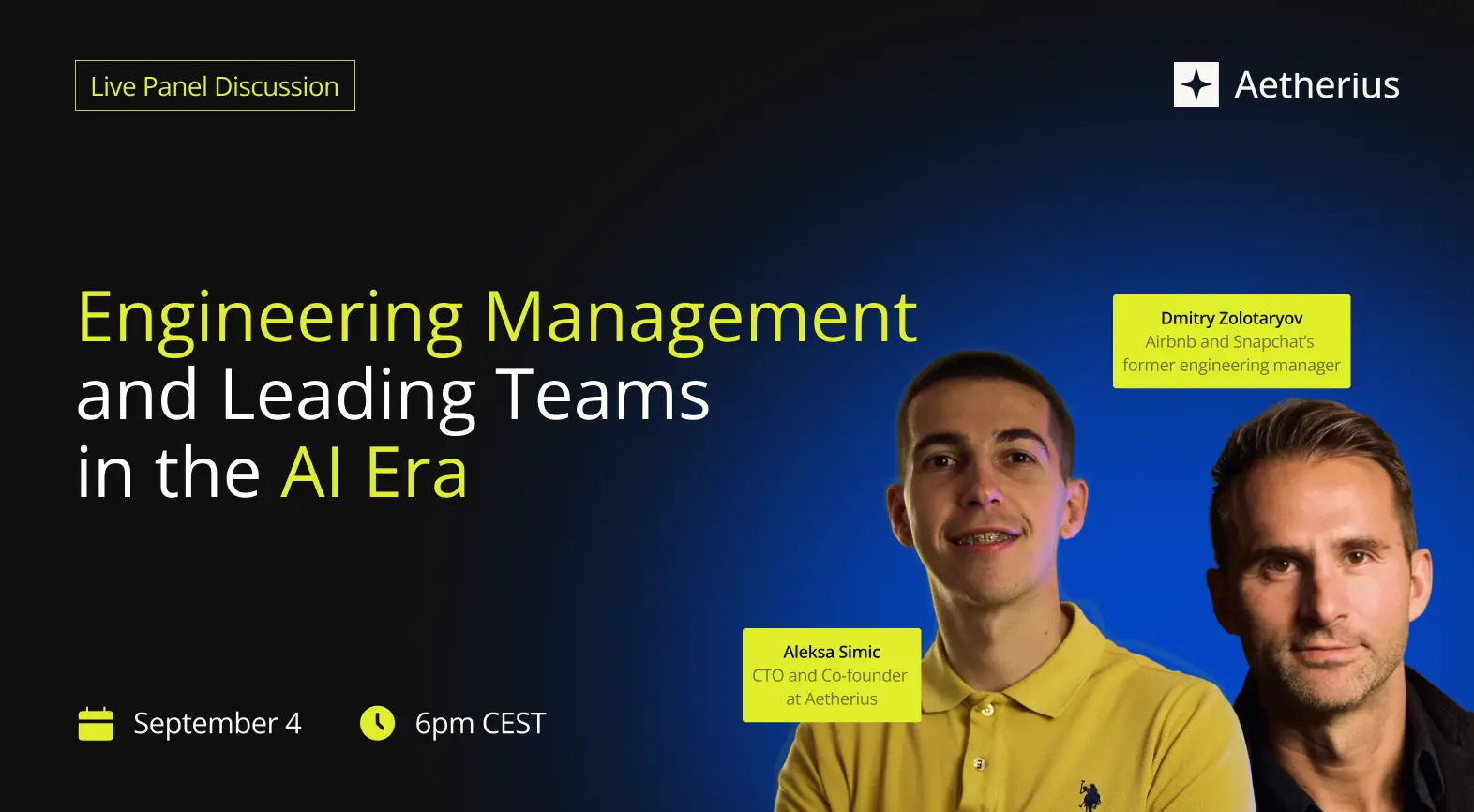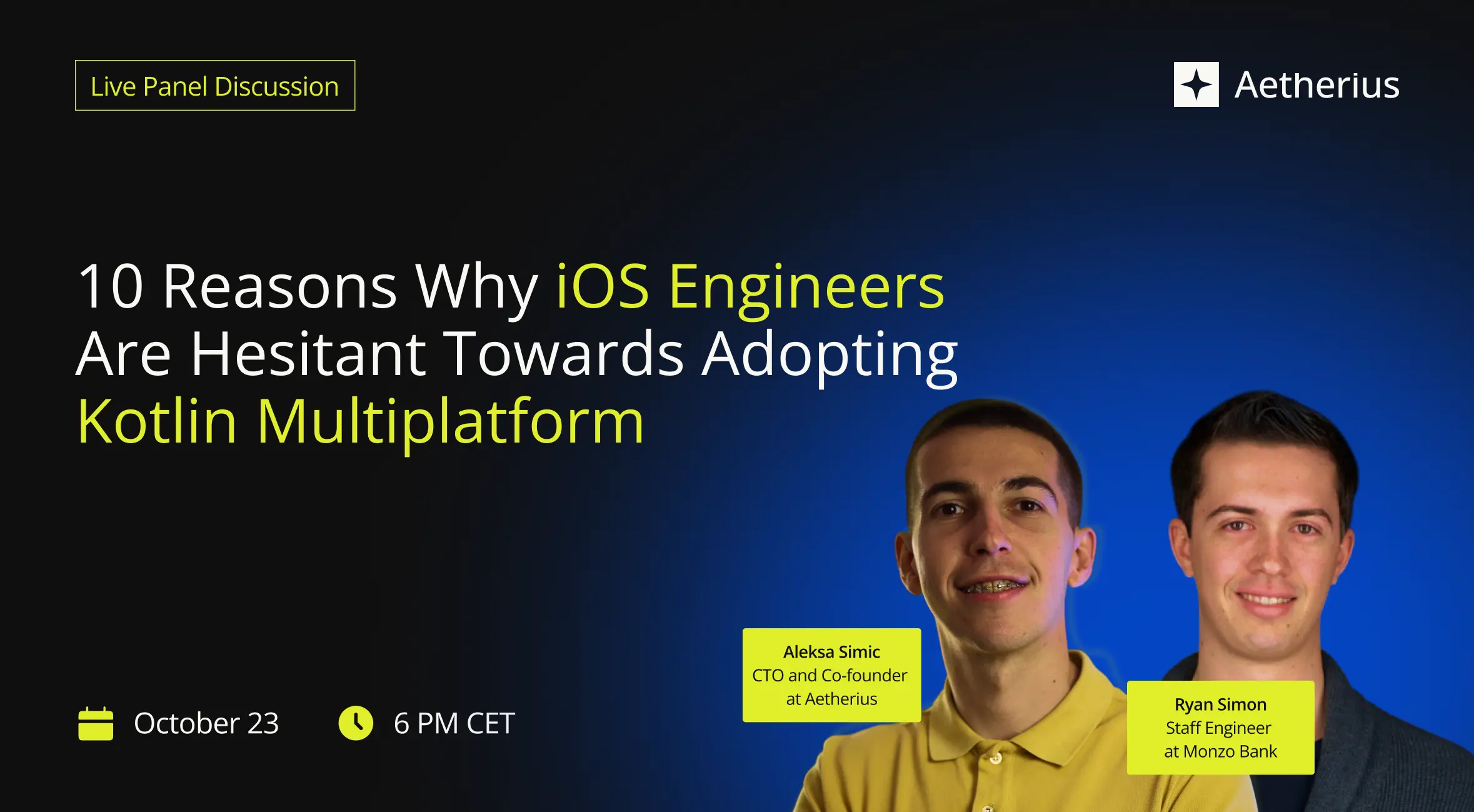
Looking for Senior Mobile Experts?
We can help you!
Key Takeaways from Our Webinar on Remote Team Management and AI in Mobile Development

Discover key insights on remote team leadership, AI-assisted coding, and Kotlin Multiplatform from our expert-led webinar.
We hosted a webinar “Engineering Management and Leading Teams in the AI Era” with Aleksa Simić, co-founder and CTO at Aetherius, and Dmitry Zolotaryov, former engineering manager at Airbnb and Snapchat. They discussed the challenges of managing remote and hybrid teams, the role of AI in software development, and insights into mobile development frameworks like Kotlin Multiplatform. The session provided advice for engineering managers, CTOs, and developers interested in optimizing team collaboration, improving software delivery speed and quality, and using AI tools for coding and code review.
Who is Dmitry Zolotaryov?

Dmitry Zolotaryov is an experienced engineering manager who worked at Airbnb and Snapchat, with a proven track record of leading remote and hybrid engineering teams. Over the years, he has guided teams in mobile app development, dealing with complex challenges in cross-platform frameworks and AI-assisted workflows. His approach emphasizes trust, collaboration, and hiring individuals with strong ownership, initiative, and communication skills, especially in remote environments.
How do our CTO and Dmitry know each other?
Aetherius CTO and Co-founder, Aleksa, worked with Dmitry together on a startup project that had just raised $200-300k in funding. The goal was to build a social network for finding people to play sports like basketball or volleyball in San Francisco and Los Angeles.

At the time, iOS 16 had just launched, allowing the team to experiment with NavigationStack and the latest UI components. The challenge was to make the app feel unique but easy to use while handling real-time interactions. Dmitry led the engineering side, guiding the team and jumping in whenever needed.
The project was intense but educational; one week of work felt like a month of learning in a typical job. After the three-month project concluded, they stayed in touch, finding that their approaches to mobile development were remarkably similar. During a recent catch-up, the conversation turned to AI’s impact on remote team management, which inspired the idea for this webinar.
Before we dive into the Q&A, it’s worth noting the format of the webinar. Aleksa Simić, our CTO, guided the conversation by asking questions, while Dmitry Zolotaryov, former engineering manager at Airbnb and Snapchat, shared his experiences and expertise.
Q: What is the main leadership lesson you learned while managing remote and hybrid teams?
Dmitry: Trust and collaboration are much more challenging in fully remote work compared to hybrid or in-person settings. Hybrid teams maintain some physical closeness, which makes building relationships easier, but remote teams require intentional strategies to foster engagement, ownership, and communication.
Q: How do you differentiate between hybrid and remote work environments?
Dmitry: Hybrid work feels closer to in-person work with perks like working from home one or two days per week. Remote work, on the other hand, has no physical closeness, making trust and collaboration harder to establish.
Q: What qualities are crucial for building a high-performing remote team?
Dmitry: A combination of technical expertise and interpersonal skills is key. I look for:
- Ownership and initiative
- Good communication and collaboration
- Big-picture thinking
- Friendly, easy-to-work-with personalities
Hiring for ownership and initiative is especially important in remote teams.
Q: How do you assess ownership and initiative during interviews?
Dmitry: I use the STAR methodology, where candidates describe past experiences by detailing the Situation, Task, Action, and Result. This helps me see concrete examples of how they took ownership or initiative, along with outcomes and recognition.
Q: How has AI impacted the speed and quality of software delivery?
Dmitry: AI tools can boost productivity and improve code quality by assisting in coding and code reviews. Tools like Cursor, Coursera, Juni from JetBrains, and Cloud Code are particularly useful. That said, engineers are still responsible for reviewing AI-generated code and standing behind it.
Q: What concerns exist around AI and industry consolidation?
Dmitry: While AI has clear productivity benefits, I’m concerned about over-reliance on a few dominant companies controlling software development. This could reduce diversity in tools and platforms. Teams need to balance AI adoption with maintaining their own expertise.
Q: How might AI influence mobile development frameworks?
Dmitry: Cross-platform frameworks like React Native and Kotlin Multiplatform benefit from AI due to their open-source nature. AI can support shared business logic while native UI handles performance-critical tasks. I see AI as a productivity booster, not a replacement for core engineering skills.
Q: How important is understanding end-user requirements in software delivery?
Dmitry: It’s crucial. The balance between speed and quality depends on user expectations and industry context. AI can speed up delivery, but understanding the end-user ensures performance, bug handling, and experience meet expectations.
Q: What is MCP, and why are you excited about it?
Dmitry: MCP (Mobile Communications Protocol) could integrate services like Gmail, calendars, and project management tools directly into coding environments. Combined with AI assistants, it could reduce context switching, streamline workflows, and even simplify user interfaces.
Key takeaways from the webinar
- Remote team management requires more trust and structured communication than hybrid setups.
- Ownership, initiative, and communication skills are as important as technical expertise in high-performing remote teams.
- AI in software development can increase productivity and improve code quality, but doesn’t replace an engineer's responsibility.
- Tools like Cursor, JetBrains AI tools, and Cloud Code are shaping modern coding practices.
- Cross-platform frameworks like Kotlin Multiplatform benefit from AI support while enabling native performance where needed.
- The STAR methodology is effective for hiring remote engineers with ownership and initiative.
- MCP and AI personal assistants may transform software workflows and UI interactions in the near future.
Conclusion
This webinar offered practical insights into remote team collaboration, AI-assisted coding, and mobile development frameworks. For engineering leaders, it’s a reminder that balancing speed, quality, and human factors is essential in today’s fast-evolving tech landscape.
You can watch the full Engineering Management and Leading Teams in the AI Era video.
If you want to explore AI in mobile development or build a high-performing remote engineering team, contact us today to see how our expertise can help your project succeed.
to Build Your App?
Need Experienced Devs to Build Your App?



.svg)


